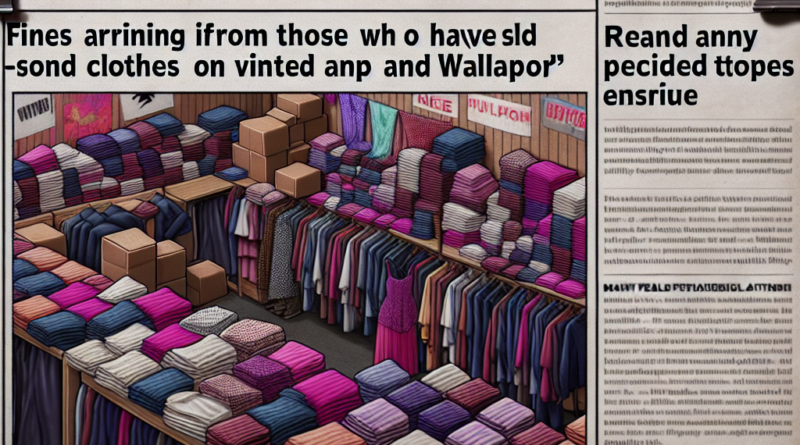Fines Looming for Sellers of Second-Hand Clothing and Items on Vinted and Wallapop
Upcoming Fines for Selling Used Clothes and Items on Vinted and Wallapop
Are you at risk of receiving fines for selling second-hand clothes and items on platforms like Vinted and Wallapop? The threat looms, even for honest sellers unaware of new regulations governing online commerce.
The sale of used goods is not always considered a non-habitual activity, thus making it essential to adhere to tax regulations imposed by one’s country—in this case, by the Italian tax authorities—since failing to do so may lead to accusations of tax evasion.
Who is at Risk of Online Selling Penalties?
If you occasionally sell items or clothing that you no longer use on Vinted or Wallapop, you typically don’t owe taxes or have filing obligations.
However, upon meeting certain criteria, you might face penalties for unreported income and may be compelled to register for a VAT number, leading to various obligations.
The challenge lies in distinguishing between occasional sales and professional sales, a boundary not defined by minimum income or sales volume, but rather by the nature of the commerce.
In Italy, this new regulation took effect on January 1, 2023, with platforms required to report users’ online sales data starting in 2024.
This new compliance stems from the DAC7 directive of 2021, which mandates online sales platforms to report user sales data to combat tax evasion linked to e-commerce.
Not Just Vinted and Wallapop
It’s crucial to note that the EU directive does not apply solely to Vinted and Wallapop, but to all platforms allowing sales of goods or services, including Amazon, Etsy, Vestiaire Collective, eBay, and even Airbnb.
If a seller exceeds the threshold of 30 sales or earns over €2,000 in a calendar year, they must fill out a form containing their personal data.
However, this does not automatically mean they owe taxes; tax obligations must be verified according to local laws.
The reporting requirements will apply to individual sellers as follows: they must provide their name, date of birth, address, and either their tax identification number or VAT number, while businesses must furnish their business name and tax identification details.
Vinted’s Position
Vinted reassures users, stating, “Selling personal items through Vinted is not taxable in Italy, even if sold at a higher price than the purchase price.
Meeting DAC7 thresholds for information does not imply tax liability; typically, only businesses owe taxes.
Therefore, it’s inaccurate to say individuals are fined for sales on these platforms.” However, it must be clarified that buying an item for personal use and reselling it does not constitute a professional activity, while buying specifically for reselling does require opening a VAT number.
Understanding Compliance to Avoid Fines
Platforms like Vinted and Wallapop must provide user data that can be audited by Italian tax authorities.
Data transmission must occur by December 31 of each year (extended to January 31, 2024, for this year).
The Italian tax agency will evaluate whether reported sales classify as commercial activities, and once data is received, they can enforce any owed taxes.
For those who occasionally sell second-hand items without exceeding mentioned thresholds, they will neither need to submit the reporting form nor pay income tax on those sales.
The critical aspect is that repeated, organized sales might prompt the tax agency to classify your activity as professional, necessitating adherence to tax obligations.
Ultimately, if the AGENCY discovers unreported commercial activities, they may pursue tax recovery, demanding payment for due taxes not previously declared.




